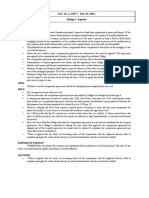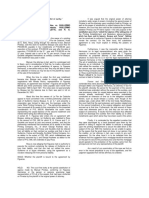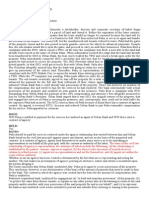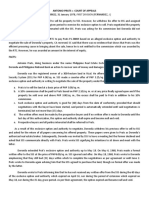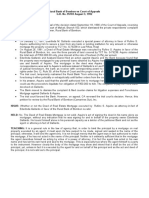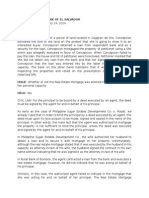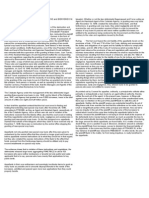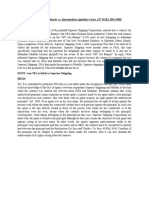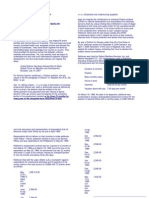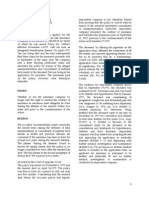National Food Authority (NFA) v. IAC
National Food Authority (NFA) v. IAC
Uploaded by
Fayda CariagaCopyright:
Available Formats
National Food Authority (NFA) v. IAC
National Food Authority (NFA) v. IAC
Uploaded by
Fayda CariagaOriginal Description:
Copyright
Available Formats
Share this document
Did you find this document useful?
Is this content inappropriate?
Copyright:
Available Formats
National Food Authority (NFA) v. IAC
National Food Authority (NFA) v. IAC
Uploaded by
Fayda CariagaCopyright:
Available Formats
National Food Authority (NFA) v.
IAC
Facts: Medalla, as a commission agent of plaintiff Superior Shipping Corporation,entered into a contract for hire of ship (MV Sea Runner) with defendant NFA.The contract obligated Medalla to transport on the MV Sea Runner 8,550 sacksof rice belonging to NFA from Occidental Mindoro to Malabon, Metro Manila.Upon completion of the delivery, plaintiff wrote a letter around October 1979,requesting NFA that it be allowed to collect the amount for freightage andother charges. Plaintiff wrote again around November 1979, this timespecifically requesting that payment be made to it and not to Medalla becauseplaintiff was the owner of the vessel.On November 16, 1979, NFA informed plaintiff that it could not grant itsrequest because the contract to transport the rice was entered into by NFAand defendant Medalla who did not disclose that he was acting as a mereagent of plaintiff. Thereupon on November 19, 1979, defendant NGA paiddefendant Medalla the sum of P25,974.90, for freight services.On December 4, 1979, plaintiff wrote defendant Medalla demanding that heturn over to plaintiff the amount of P27,000.00 paid to him by defendant NFA.Defendant Medalla, however, "ignored the demand." Issue: Whether NFA is jointly and severally liable with defendant Medalla. Held: Yes, NFA is solidarily liable with defendant Medalla. Ratio: It is an undisputed fact that Gil Medalla was a commission agent ofrespondent Superior Shipping Corporation which owned the vessel "MV SeaRunner" that transported the sacks of rice belonging to petitioner NFA. Thecontext of the law is clear. Art. 1883, which is the applicable law in the case atbar provides: Art. 1883. If an agent acts in his own name, the principal has noright of action against the persons with whom the agent hascontracted; neither have such persons against the principal. In such case the agent is the one directly bound in favor of theperson with whom he has contracted, as if the transaction werehis own, except when the contract involves things belongingto the principal. The provision of this article shall be understood to be withoutprejudice to the actions between the principal and agent. Consequently, when things belonging to the principal (in this case, Superior Shipping Corporation) are dealt with, the agent is bound to the principal although he does not assume the character of such agent and appears acting inhis own name
. In other words, the agent's apparent representation yields to theprincipal's true representation and that, in reality and in effect, the contractmust be considered as entered into between the principal and the third person . Corollarily, if the principal can be obliged to perform his duties under the
contract, then it can also demand the enforcement of its rights arising from
the contract
You might also like
- List of Agricultural Companies in KenyaDocument27 pagesList of Agricultural Companies in Kenyaangie_nimmo73% (45)
- TRUMPF TRUBEND 5230 Technical DataDocument11 pagesTRUMPF TRUBEND 5230 Technical DatacoronaqcNo ratings yet
- 043 - Philippine Products Company V Primateria (1965) (Miguel, V)Document2 pages043 - Philippine Products Company V Primateria (1965) (Miguel, V)VM MIGNo ratings yet
- Beyond TelepathyDocument364 pagesBeyond Telepathyneonpanther94% (18)
- Differential Forms and Applications (Do Carmo)Document124 pagesDifferential Forms and Applications (Do Carmo)Hideki Kawana100% (1)
- Litonjua vs. Eternit CorpDocument2 pagesLitonjua vs. Eternit CorpNikki AndradeNo ratings yet
- Pichel Vs Alonzo DigestDocument2 pagesPichel Vs Alonzo DigestJoanna Mandap100% (1)
- Garcia V ManzanoDocument1 pageGarcia V Manzanosmtm06No ratings yet
- Case Digest - Nfa v. Iac - AgencyDocument1 pageCase Digest - Nfa v. Iac - AgencymileyNo ratings yet
- Pasno Vs Ravina DigestDocument1 pagePasno Vs Ravina DigestMary Kaye ValerioNo ratings yet
- Far East Bank V Cayetano DigestDocument4 pagesFar East Bank V Cayetano Digestsescuzar100% (1)
- Domingo Vs DomingoDocument1 pageDomingo Vs DomingodmcfloresNo ratings yet
- Rural Bank of Borbon (Camarines Sur), Inc. v. CADocument2 pagesRural Bank of Borbon (Camarines Sur), Inc. v. CARuben100% (1)
- Mendoza Vs PauleDocument3 pagesMendoza Vs PauleChaoSisonNo ratings yet
- CMS Logging v. CADocument3 pagesCMS Logging v. CApurplebasketNo ratings yet
- Diolosa v. CADocument1 pageDiolosa v. CAd2015memberNo ratings yet
- Rocha v. PratsDocument1 pageRocha v. PratsJose Edmundo DayotNo ratings yet
- G.R. No. L-18377. Dec 29, 1962.: Duñgo v. LopenaDocument1 pageG.R. No. L-18377. Dec 29, 1962.: Duñgo v. LopenaHazel P.100% (1)
- 10 Villa vs. Garcia Bosque DIGESTDocument1 page10 Villa vs. Garcia Bosque DIGESTTeresa CardinozaNo ratings yet
- Singsong vs. Isabella Sawmill - DigestDocument5 pagesSingsong vs. Isabella Sawmill - DigestTogz MapeNo ratings yet
- Homeowners Savings & Loan Bank V.dalioDocument5 pagesHomeowners Savings & Loan Bank V.dalioMarkSamuelPadasasIgnacioNo ratings yet
- (AGENCY) (Tuason v. Orozco)Document1 page(AGENCY) (Tuason v. Orozco)Alyanna Apacible100% (1)
- Litonjua V LitonjuaDocument9 pagesLitonjua V LitonjuaHudson CeeNo ratings yet
- Heirs of Lim v. LimDocument2 pagesHeirs of Lim v. LimGia DimayugaNo ratings yet
- Bricktown Development Corp V Amor Tierra DevelopmentDocument2 pagesBricktown Development Corp V Amor Tierra DevelopmentEiffel Usman MarrackNo ratings yet
- Ramon v. CaoibesDocument2 pagesRamon v. CaoibesCamille BritanicoNo ratings yet
- Lim Chai Seng v. Trinidad (Mr. Lovestruck) : Agency - Chapter 3 Cases - Block 2A 2022 - Ateneo Law SchoolDocument3 pagesLim Chai Seng v. Trinidad (Mr. Lovestruck) : Agency - Chapter 3 Cases - Block 2A 2022 - Ateneo Law SchoolErinNo ratings yet
- Digest - PNB Vs Manila SuretyDocument1 pageDigest - PNB Vs Manila SuretyLilibeth Dee Gabutero100% (1)
- Ngo Tian Tek Vs Phil EducationDocument1 pageNgo Tian Tek Vs Phil Educationdivina gracia hinlo100% (1)
- Digest Agency ExamDocument9 pagesDigest Agency ExamLyra AguilarNo ratings yet
- Del Rosario v. La BadeniaDocument3 pagesDel Rosario v. La BadeniaKevin Hernandez100% (2)
- Danon vs. Antonio A. Brimo & Co., 42 Phil., 133, September 12, 1921Document1 pageDanon vs. Antonio A. Brimo & Co., 42 Phil., 133, September 12, 1921Rizchelle Sampang-ManaogNo ratings yet
- Tai Tong Chuache & Co. V. The Insurance Commission and Travellers Multi-IndemnityDocument8 pagesTai Tong Chuache & Co. V. The Insurance Commission and Travellers Multi-IndemnityRodeleine Grace C. MarinasNo ratings yet
- Diolosa vs. Court of Appeals - CDDocument1 pageDiolosa vs. Court of Appeals - CDmenforever100% (2)
- 09 Campos Rueda Vs Pacific CommercialDocument1 page09 Campos Rueda Vs Pacific CommercialNichole LanuzaNo ratings yet
- Urban Bank Vs PenaDocument4 pagesUrban Bank Vs PenaMark JosephNo ratings yet
- Oliver vs. PSBDocument2 pagesOliver vs. PSBLari dela RosaNo ratings yet
- ANTONIO PRATS V COURT OF APPEALSDocument2 pagesANTONIO PRATS V COURT OF APPEALSRani MaeNo ratings yet
- Buncio and Co V Ong GuanDocument1 pageBuncio and Co V Ong GuanAbraham GuiyabNo ratings yet
- Heirs of Candelaria v. RomeroDocument1 pageHeirs of Candelaria v. RomeroDGDelfinNo ratings yet
- PNB v. BagamaspadDocument2 pagesPNB v. BagamaspadJP Murao IIINo ratings yet
- Rural Bank of Borbon Vs Court of AppealsDocument1 pageRural Bank of Borbon Vs Court of AppealsWilliam Christian Dela Cruz0% (1)
- Bedia vs. White / AgencyDocument3 pagesBedia vs. White / AgencyMaria Francheska GarciaNo ratings yet
- Bucton v. Rural Bank of El SalvadorDocument2 pagesBucton v. Rural Bank of El SalvadorJCNo ratings yet
- Vda de Albar V. Carangdang: Petitioner Respondent: Josefa Fabie de Carandang Ponencia: Bautista Angelo, JDocument5 pagesVda de Albar V. Carangdang: Petitioner Respondent: Josefa Fabie de Carandang Ponencia: Bautista Angelo, JAleezah Gertrude RaymundoNo ratings yet
- Diolosa V CADocument2 pagesDiolosa V CABettinaaaNo ratings yet
- A Written Report On Agency Articles 1878-1883: Cor Jesu CollegeDocument8 pagesA Written Report On Agency Articles 1878-1883: Cor Jesu CollegeCharlotte GallegoNo ratings yet
- Filipinas Life Assurance v. PedrosoDocument2 pagesFilipinas Life Assurance v. PedrosoIldefonso HernaezNo ratings yet
- Woodchild Holdings v. Roxas Electric and Construction Company, IncDocument5 pagesWoodchild Holdings v. Roxas Electric and Construction Company, IncCarie Lawyerr100% (1)
- Domingo Vs DomingoDocument2 pagesDomingo Vs DomingoJani Misterio100% (1)
- OLIVER v. PSB (2016) Topic: PartiesDocument3 pagesOLIVER v. PSB (2016) Topic: Partiesdelayinggratification100% (1)
- Smith Bell v. Sotelo MattiDocument1 pageSmith Bell v. Sotelo Mattialfred chuaNo ratings yet
- F10 - PNB vs. BagamaspadDocument1 pageF10 - PNB vs. BagamaspaddmcfloresNo ratings yet
- Lim Vs CADocument2 pagesLim Vs CAara100% (1)
- Manila Remnant Vs CADocument2 pagesManila Remnant Vs CARobert Ramirez100% (2)
- Secuya V Vda de SelmaDocument1 pageSecuya V Vda de SelmaJasOn EvangelistaNo ratings yet
- Ortiz V Kayanan July 30, 1979 GR No. L-32974Document8 pagesOrtiz V Kayanan July 30, 1979 GR No. L-32974Romarie AbrazaldoNo ratings yet
- Dominion Insurance Corp. v. Court of AppealsDocument3 pagesDominion Insurance Corp. v. Court of AppealsLoruel Kyle Nadayag100% (1)
- 016 Tan V GVT Engineering ServicesDocument3 pages016 Tan V GVT Engineering ServicesjadelorenzoNo ratings yet
- Agency - Sevilla vs. CA 160 SCRA 171Document2 pagesAgency - Sevilla vs. CA 160 SCRA 171Maria Fiona Duran Merquita100% (3)
- Lozana vs. Depakakibo: Case DigestDocument2 pagesLozana vs. Depakakibo: Case Digestfirmo minoNo ratings yet
- Gozun vs. MercadoDocument7 pagesGozun vs. MercadoCarie LawyerrNo ratings yet
- 3rd Batch PDFDocument71 pages3rd Batch PDFNyl John Caesar GenobiagonNo ratings yet
- National Grains Authority VsDocument1 pageNational Grains Authority VsMikaela ArceoNo ratings yet
- A.M. No. P-08-2458Document1 pageA.M. No. P-08-2458Fayda CariagaNo ratings yet
- Labor CasesDocument211 pagesLabor CasesFayda CariagaNo ratings yet
- PALE Nos 2-19Document48 pagesPALE Nos 2-19Fayda CariagaNo ratings yet
- Cases To DigestDocument20 pagesCases To DigestFayda CariagaNo ratings yet
- Davao Fruits Corporation vs. Associated Labor Unions (Alu)Document2 pagesDavao Fruits Corporation vs. Associated Labor Unions (Alu)Fayda CariagaNo ratings yet
- Digest InsuranceDocument28 pagesDigest InsuranceFayda Cariaga100% (1)
- AFFIDAVIT NewDocument3 pagesAFFIDAVIT NewFayda CariagaNo ratings yet
- List of CasesaDocument9 pagesList of CasesaFayda CariagaNo ratings yet
- Anastacio Viaña vs. Alejo Al-LagadanDocument2 pagesAnastacio Viaña vs. Alejo Al-LagadanFayda CariagaNo ratings yet
- Martinez v. Ong Pong CoDocument4 pagesMartinez v. Ong Pong CoFayda CariagaNo ratings yet
- Primitivo Siasat Vs IacDocument3 pagesPrimitivo Siasat Vs IacFayda CariagaNo ratings yet
- Air Material Wing Savings and Loan Association, Inc. vs. NLRCDocument2 pagesAir Material Wing Savings and Loan Association, Inc. vs. NLRCFayda CariagaNo ratings yet
- LetterDocument1 pageLetterFayda CariagaNo ratings yet
- Alfonso Del Castillo vs. Shannon RichmondDocument1 pageAlfonso Del Castillo vs. Shannon RichmondFayda CariagaNo ratings yet
- Ferdinand Marcos Raul Manglapus: Constitutional Law Ii Topic: Liberty of AbodeDocument1 pageFerdinand Marcos Raul Manglapus: Constitutional Law Ii Topic: Liberty of AbodeFayda CariagaNo ratings yet
- Primitivo Siasat Vs IacDocument3 pagesPrimitivo Siasat Vs IacFayda CariagaNo ratings yet
- Abante V LamadridDocument1 pageAbante V LamadridFayda CariagaNo ratings yet
- Lesson 4Document8 pagesLesson 4Clauditte SaladoNo ratings yet
- ReadingDocument2 pagesReadingBlack ArrayNo ratings yet
- Juki HZL-K85 Sewing Machine Service ManualDocument39 pagesJuki HZL-K85 Sewing Machine Service ManualiliiexpugnansNo ratings yet
- CloudPortalHub Case Study 2Document4 pagesCloudPortalHub Case Study 2gsbeniNo ratings yet
- Notice: Antidumping: Large Newspaper Printing Presses and Components Assembled or Unassembled From— Various CountriesDocument2 pagesNotice: Antidumping: Large Newspaper Printing Presses and Components Assembled or Unassembled From— Various CountriesJustia.comNo ratings yet
- Disruptive TechnologyDocument15 pagesDisruptive TechnologybinalamitNo ratings yet
- Corrosion Behaviour of CIDocument1 pageCorrosion Behaviour of CIBaher ElsheikhNo ratings yet
- A. J. Weberman's FBI DocumentsDocument392 pagesA. J. Weberman's FBI DocumentsAlan Jules WebermanNo ratings yet
- câu hỏi NPTAUDDocument4 pagescâu hỏi NPTAUDnghiep tranNo ratings yet
- SOEN 357: User Interface DesignDocument33 pagesSOEN 357: User Interface DesignmusicbrahNo ratings yet
- ArticleDocument11 pagesArticleKurt Randy ZepedaNo ratings yet
- 2019 Zone BDocument2 pages2019 Zone BMaryemNo ratings yet
- TeachingPreparednessofPre ServiceTeachers PerceptiontoPracticeDocument23 pagesTeachingPreparednessofPre ServiceTeachers PerceptiontoPracticeShyra SerencioNo ratings yet
- First Aid (CPR AND CHOKING)Document29 pagesFirst Aid (CPR AND CHOKING)kula diamondNo ratings yet
- Aa BB CC DD Ee FF GG HH Ii JJ KK LL MM NN Oo PP QQ RR Ss TT Uu VV WW XX Yy ZZDocument49 pagesAa BB CC DD Ee FF GG HH Ii JJ KK LL MM NN Oo PP QQ RR Ss TT Uu VV WW XX Yy ZZRIKKI GEL100% (1)
- Sonnet 29Document11 pagesSonnet 29Wissam ChaabanNo ratings yet
- Strategies For Reaching All StudentsDocument10 pagesStrategies For Reaching All Studentsapi-564282705No ratings yet
- Implement Design Principles To Produce Creative Art WorkDocument14 pagesImplement Design Principles To Produce Creative Art WorkcogaicjamesNo ratings yet
- Diamond Pharmacy LTD - Business PlanDocument15 pagesDiamond Pharmacy LTD - Business PlanEbai A. Ayuk NkemNo ratings yet
- Dr. Mareau's IslandDocument2 pagesDr. Mareau's IslandMarijoy MabbaguNo ratings yet
- LeEco India - Authorized Service CentersDocument140 pagesLeEco India - Authorized Service CentersAshok NNo ratings yet
- WAng 2022Document15 pagesWAng 2022guerguerNo ratings yet
- 632A1E5E-644C-EA52-8771-E0D2155BF9ACDocument214 pages632A1E5E-644C-EA52-8771-E0D2155BF9ACWillie BrownNo ratings yet
- Dilg ReportDocument13 pagesDilg ReportCarol F NalusNo ratings yet
- Sunshine-Gante - Requirements in Contemporary WorldDocument5 pagesSunshine-Gante - Requirements in Contemporary WorldSunshine C GanteNo ratings yet
- Aluminum Co. of America v. United States, 302 U.S. 230 (1937)Document3 pagesAluminum Co. of America v. United States, 302 U.S. 230 (1937)Scribd Government DocsNo ratings yet

















